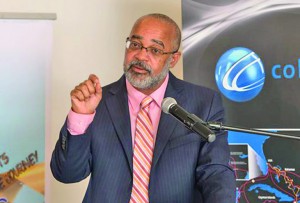
The formulation of a Caribbean Examinations Council (CXC) Strategic Plan 2014-2020, among other issues dominated the council’s 45th meeting in Guyana.
According to a release, the council also looked at the erection of a new CXC headquarters building in Barbados and the development of new syllabi for the Caribbean Secondary Education Certificate (CSEC) and the Caribbean Advanced Proficiency Examination (CAPE).
For the strategic plan, CXC Registrar, Dr Didacus Jules noted that the council will focus on three strategic objectives which are: strengthening the CXC business model, securing financial stability and delivering an enhanced stakeholder experience.
As it relates to the syllabi, CXC Pro-Registrar Glenroy Cumberbatch said, “We are looking at a green energy engineering syllabus… we’re looking at alternative ways to get energy in the Caribbean.”
He noted that this decision was made since there are a number of individual countries within the Caribbean looking at other means of producing energy.
“But who are the people to build these systems, who are the people who can then make payments to these systems?” he questioned.
“We don’t want to develop that then someone outside of our region are the people who are earning the money… we want to make sure that our students have a sense of knowledge to develop these… so that the jobs that are being created will go towards our own people,” Cumberbatch added.
As such, he said the overall thinking is that students will be able to gain a good education as well as life skills for the world of work.
First paperless examination
CXC is also looking at offering Digital Media as a subject, for which a syllabus was formulated and approved for teaching in 2013 and the first paperless examination is set for May/ June 2014.
Meanwhile, highlighting the council’s plans to tackle the below-par performance in mathematics and English, Dr Jules said “We need to understand that when we are talking about education, there are no quick fix solutions. It requires investment, it takes time… and we have to understand that education is not what I call an eco-system, some of these problems start from pre-school level.”
He said a regional literacy and numeracy strategy was developed in 2012, as well as a number of other short and long term plans which were shared with all governments in the Caribbean.
Cumberbatch added too, that despite the low performances displayed, “I will tell you that there are more people writing English and getting acceptable grades now, than any time in the history of the Caribbean, so there is progress.”
It was also noted that less children registered for this year`s May/ June CSEC examinations with a total of 149,311 compared to last year`s 156,970. Subject entries fell by just over 19,000. However, the subject entries for CAPE increased this year compared to 2012.



